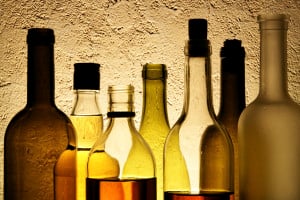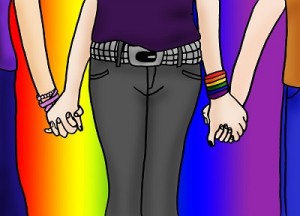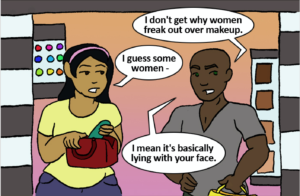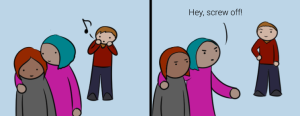Originally published on xoJane and republished here with their permission.
I used to dream about my 21st birthday.
I couldn’t wait until I didn’t have to hit up older friends to buy me booze or beg them to let me use their ID to get into a bar. I so badly wanted the day to come so that when I saw a police car or heard sirens, I didn’t immediately panic about being caught for drinking underage.
Turning 21 was so close, just about in my grasp, on the day I ended up in one of those dreaded police cruisers on the way to the hospital.
It was May 7, 2013, just about two-and-a-half years ago. Little did I know that would be my last drink. Four months later, I’d be celebrating my 21st as a recovering alcoholic.
So many moments and incidents led up to my last drink, but I never wanted to acknowledge them. I’d only started drinking at the beginning of college – not even two years earlier. How could I have developed an alcohol dependency so quickly?
I wish I had known more then, or read stories like my own, because I could have saved myself a lot of trouble. Instead, I spent my first two years of college being a sloppy, wasted mess instead of a sober, functional, put-together human.
After being hospitalized with what should have been an almost fatal blood alcohol content, my parents had had enough. They decided I needed help – more help than they could provide. In other words, rehab. A word I had never, ever attached to myself.
I was a smart, successful college student with a 3.6 GPA and many friends. I just liked to have a good time, which occasionally got out of hand. Girls like me didn’t go to rehab. We just grew out of this phase – at least, that’s what I told myself.
But I think on some deeper, subconscious level, I knew that I needed help. Normal college students didn’t drink alone, or before class, or sneak drinks while hiding in a bathroom stall.
I knew this, but I refused to come to terms with it on any other level. Instead, I just went through the motions, attending my out-patient rehab sessions and making it clear I didn’t want to be there.
A few days without drinking passed, then a week, then an entire month. Much to my astonishment, my life wasn’t horrible. I felt healthier, and not having hangovers wasn’t the worst thing in the world.
So I hastily posted a status on Facebook about what was going on and why I was basically MIA. I braced myself, waiting for the onslaught of rude comments. But there wasn’t even one. Instead, words of support and kindness starting pouring in.
Admitting my lack of control over the situation was the best thing I could have done. Had I continued to hide it, I truly believe I would have returned to drinking.
After admitting the truth to the people in my life, it became easier to admit to myself. I began to open up in group sessions. I started to smile again, even laugh.
One day, I was at home with my family and in the middle of laughing, caught my dad staring at me.
“What?” I asked, ready to defend myself.
He replied, “Nothing. It’s just good to have some of the old Beth back.”
I’ll never forget that moment as long as I live because my dad isn’t the type of person who is serious very often. From there on out, I vowed not to return to the person I had become in the past two years – if not for myself, then for my family.
As the months passed, life only continued to improve. Before ending up in the hospital, I had been planning to study abroad the coming fall semester. After everything that happened, it was up in the air as to whether I’d still be traveling to Chile for five months.
After building three months of sobriety, my family and I decided I could handle it. In fact, we thought it would be good for me to get away from the people and places where my drinking had escalated. Not forever, but for now.
So I went. A month after arriving, I celebrated my 21st birthday. I won’t say the day was easy, but it was manageable. All I had to do was keep taking it a minute at a time, like I had been doing for the past four months.
I spent my 21st birthday eating “manjar” cake and toasting with fizzy juice, surrounded by friends who loved me and a breathtaking, awe-invoking country. I realized that life could certainly have been worse.
In a big way, I owe my sobriety to those five months of my life. Chile healed me and brought me back down to earth. It kept me in each moment of each day. Before I knew it, the day would be over and I’d barely have thought about alcohol.
After returning from Chile with eight months of sobriety under my belt, I began to be even more vocal about it. I returned to the center where I had gotten sober and spoke to patients currently in treatment. I began a blog called Life To Be Continued because writing has served as a large part of my sobriety.
But more than that, I wanted to reach out to others suffering with the same disease as me and to offer hope. I wanted them to know it does get better and it does get easier.
On May 7 of 2013, if someone had told me I was having my last drink and that I would celebrate my 21st birthday sober, I would have laughed. Then I probably would have cried. Today, I can’t imagine my life any other way.
There have been moments of frustration and self-pity, but I wouldn’t change one thing about the path I have walked (and sometimes crawled).
The roadblocks in our lives have a way of pushing us into the exact places we are supposed to be in life, and I truly believe that fate intervened in my journey to alcoholism, but more importantly, to sobriety.
[do_widget id=’text-101′]
Beth Leipholtz is a Minnesotan girl, navigating sobriety in her early 20s. She writes often, and about an array of topics. She graduated from the College of Saint Benedict with a degree in Communication and is currently figuring out that awkward transition from college to the real world. Follow her at “el9292” on Twitter and Instagram.
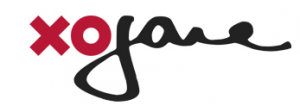
Search our 3000+ articles!
Read our articles about:
Our online racial justice training
Used by hundreds of universities, non-profits, and businesses.
Click to learn more
Most Read Articles
- « Previous
- 1
- …
- 30
- 31
- 32


